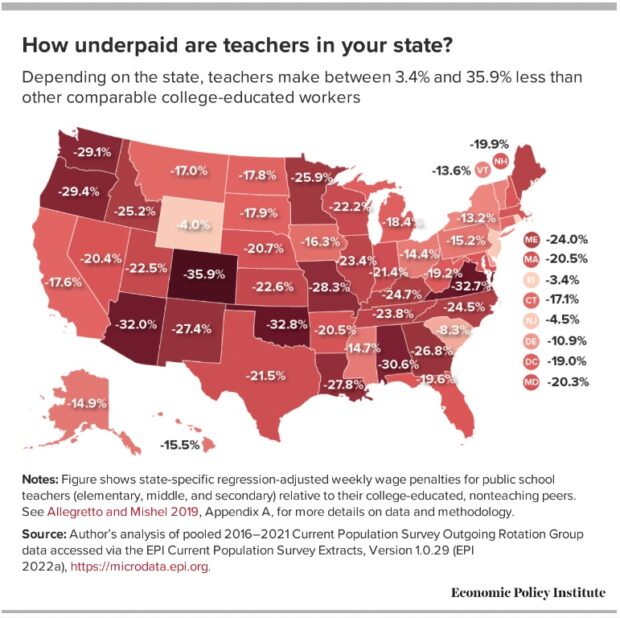The average teacher salary in Idaho increased by 3.2% to $54,806 this school year, according to the State Department of Education.
Average teacher salary has grown by $8,367 or 18%, since the career ladder was implemented in the 2016-2017 school year. However, when compared to teacher salaries in other states and after accounting for inflation, teacher pay is still relatively low.
Teachers in Idaho also make less than peers in other fields who have the same level of education.
The “inadequate pay,” as a 2021 report from the Idaho Center for Fiscal Policy called it, has paired with “growing workplace demands” to drive teachers away from schools. The timing couldn’t be worse as learners continue to recover from pandemic-era learning disruptions.
Teachers are leaving Idaho for higher pay in other states and grappling with “sharply rising rents and home prices,” the report found.
The average value of single-family homes in Idaho has increased by about 173% since the third quarter of 2011, compared with nearly 80% nationally, according to a 2022 report from the Idaho Department of Labor. In communities like Hailey and Driggs, teachers are living in campers or turning away jobs due to the cost of living.
And, according to a 2022 report from the Economic Policy Institute, an independent, nonprofit think tank, Idaho teachers made 25.2% less than other comparable college-educated workers.

In a fall 2022 EdNews survey of more than 500 Idaho teachers, 52% said low pay was a “serious” or “very serious” concern, and as of October, 27 of 36 administrators surveyed by EdNews said their teacher turnover this year was “more than average.” In their own words, teachers said their profession is becoming untenable for a myriad of reasons.
Nationally, Idaho’s teacher pay has fallen behind in five benchmark areas — starting salary, top bachelor’s, starting master’s, top master’s and top salary.
The National Education Association’s 2022 report showed that Idaho teachers earn less than the national average in all five benchmark areas. Teacher’s average top salary, or the salary they earn at the height of their career, fared worst, coming in at 48th nationally.
That data squares with a finding from the 2021 Idaho Center for Fiscal Policy report: while entry level teachers have seen pay increases, veteran teachers have not benefited from similar salary growth.
National Education Association: Idaho’s Teacher Salary Benchmark Averages
| Benchmark | Average teacher salary in Idaho | National ranking (out of 50 states, federal schools, and D.C.) | Above or below national average |
| Starting salary | $39,842 | 30 | Below national average of $41,770 |
| Top bachelor’s | $52,420 | 44 (7 states NA) | Below national average of $60,381 |
| Starting master’s | $41,233 | 42 (5 states NA) | Below national average of $45,391 |
| Top master’s | $56,797 | 46 (7 states NA) | Below national average of $70,279 |
| Top salary | $59,110 | 48 (1 state NA) | Below national average of $76,540 |
*Data according to a 2022 NEA report on 2020-2021 teacher pay
This school year, the state’s allocation for teachers’ starting salary was $40,369, according to Idaho statute.
Idaho’s teacher pay is not keeping up with inflation, teacher pay in other states, or the pay of those similarly educated. However, pay has generally increased since 2016-2017, with the exception of a pandemic-sparked pay drop in 2020-2021.
| School year | Average teacher salary |
| 22-23 | $54,806 |
| 21-22 | $53,100 |
| 20-21 | $50,794 |
| 19-20 | $51,697 |
| 18-19 | $49,794 |
| 17-18 | $48,113 |
| 16-17 | $46,439 |
Behind that overall wage growth is a history of concerted legislative efforts aimed at boosting teacher pay. Here’s a timeline:
- In 2015, lawmakers passed a five-year teacher salary career ladder, a $250 million plan to boost salaries over time.
- In 2016-2017, the career ladder went into effect.
- In 2019, the Legislature approved Gov. Brad Little’s two-year plan to increase pay for new teachers.
- In 2019, teachers became eligible to receive master teacher premiums, earning an additional $12,000 over four years. However, the program was beset by delays and criticisms and “sunsetted” in 2021, after just two cohorts of Idaho teachers received the bonuses.
- In 2020, Little introduced an advanced professional endorsement program. Under the program, the state divvies out extra funds to districts for teachers who prove their mastery.
- But districts have the option to pour those funds into salaries for all teachers rather than just to the teachers who earned them.That means that in some districts, teachers can earn up to $11,000 via yearly bonuses, while in others, there’s no such opportunity.
- In 2021, Little sought and received $44.9 million in new money for the career ladder.
- In 2022, teachers in rural and underserved districts were invited to apply for $12,000 grants to be distributed over four years. The grants will pay for educational expenses, such as additional degrees, loan repayment, or career technical certifications.
In Idaho, teacher pay is largely based on experience and education; performance isn’t a major factor.
Idaho Education News will continue to follow teacher salary policy and legislation as the session begins in 2023.
Data analyst Randy Schrader contributed to this report.
